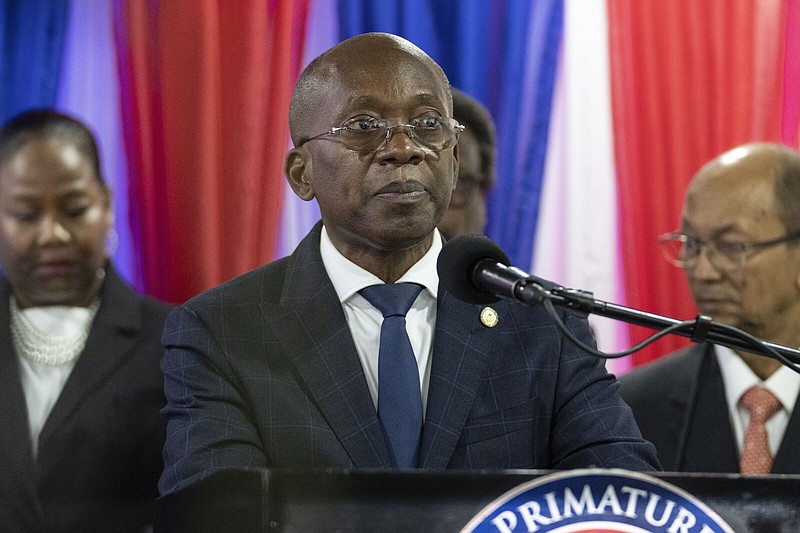PORT-AU-PRINCE, Haiti -- Ariel Henry resigned Thursday as prime minister of Haiti, leaving the way clear for a new government to be formed in the Caribbean country, which has been wracked by gang violence that killed or injured more than 2,500 people from January to March.
Henry presented his resignation in a letter signed in Los Angeles, dated Wednesday, and released Thursday by his office on the same day that a council tasked with choosing a new prime minister and Cabinet for Haiti was sworn in.
Henry's remaining Cabinet meanwhile chose Economy and Finance Minister Michel Patrick Boisvert as the interim prime minister. It was not immediately clear when the transitional council would select its own interim prime minister.
Addressing a crowded room in the prime minister's office, Boisvert said that Haiti's crisis had gone on too long and that the country now found itself at a crossroads. The members of the transitional council stood behind him, and before him, the country's top police and military officials as well as ambassadors and well-known politicians.
"After two long months of debate ... a solution has been found," Boisvert said. "Today is an important day in the life of our dear republic."
He called the transitional council a "Haitian solution" and directing his remarks toward them, Boisvert wished them success, adding, "I believe the determination is there."
After the speeches, the soft clink of glasses echoed in the room as attendees served champagne flutes toasted with a somber "To Haiti."
The council was installed earlier Thursday, more than a month after Caribbean leaders announced its creation following an emergency meeting to tackle Haiti's spiraling crisis. Gunfire heard as the council was sworn in at the National Palace prompted worried looks.
The nine-member council, of which seven members have voting powers, is also expected to help set the agenda of a new Cabinet. It will also appoint a provisional electoral commission, a requirement before elections can take place, and establish a national security council.
The council's nonrenewable mandate expires Feb. 7, 2026, at which date a new president is scheduled to be sworn in.
The council members are Emmanuel Vertilaire for Petit Desalin, a party led by former senator and presidential candidate Jean-Charles Moïse; Smith Augustin for EDE/RED, a party led by former Prime Minister Claude Joseph; Fritz Alphonse Jean for the Montana Accord, a group of civil society leaders, political parties and others; Leslie Voltaire for Fanmi Lavalas, the party of former President Jean-Bertrand Aristide; Louis Gérald Gilles for the Dec. 21 coalition that backs former Prime Minister Ariel Henry; Edgard Leblanc Fils for the Jan. 30 Collective, which represents parties including that of former President Michel Martelly; and Laurent Saint-Cyr for the private sector.
The two non-voting seats were awarded to Frinel Joseph, a pastor, and Régine Abraham, a former World Bank and Haitian government official.
Augustin, one of the council's voting members, said that it was unclear if the council would decide to keep Boisvert on as interim prime minister or choose another. He said it would be discussed in the coming days. "The crisis is unsustainable," he said.
Abraham, a nonvoting member, recalled the July 2021 assassination of President Jovenel Moïse, explaining that "that violence had a devastating impact."
Abraham said that gangs now controlled most of Port-au-Prince, tens of thousands of the capital's residents have been displaced by violence and more than 900 schools in the capital have been forced to close.
"The population of Port-au-Prince has literally been taken hostage," she said.
Gangs launched coordinated attacks that began on Feb. 29 in the capital, Port-au-Prince, and surrounding areas. They burned police stations and hospitals, opened fire on the main international airport that has remained closed since early March and stormed Haiti's two biggest prisons, releasing more than 4,000 inmates. Gangs also have severed access to Haiti's biggest port.
The onslaught began while then-Prime Minister Henry was on an official visit to Kenya to push for a U.N.-backed deployment of a police force from the East African country. He remains locked out of Haiti.
The international community has urged the council to prioritize Haiti's widespread insecurity. Even before the attacks began, gangs already controlled 80% of Port-au-Prince. The number of people killed in early 2024 was up by more than 50% compared with the same period last year, according to a recent U.N. report.
